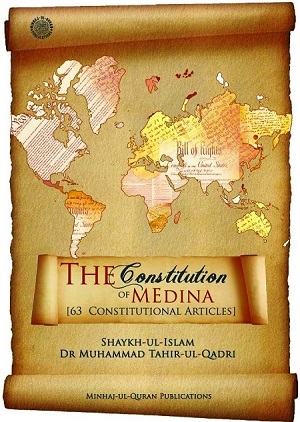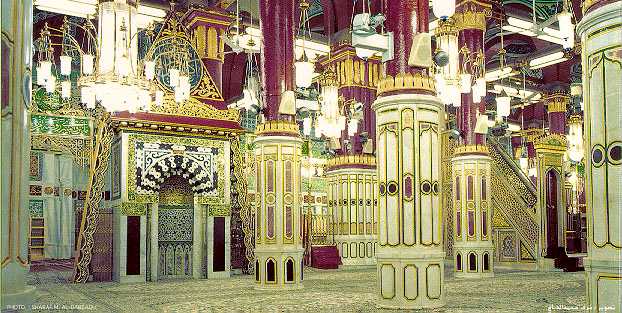 The dealings of Prophet Mohammed with other religions can best be described in the verse of the Holy Quran: “To you, be your religion, to me be mine.”
The dealings of Prophet Mohammed with other religions can best be described in the verse of the Holy Quran: “To you, be your religion, to me be mine.”
People of varied faiths and beliefs lived in the Arabian Peninsula during the life of the Prophet.
There were Christians, Jews, Zoroastrians, Polytheists, and others not affiliated with any religion. When one looks into the life of the Prophet, one may draw on many examples to portray the high level of tolerance and respect that he showed to people of other faiths.
High tolerance
In order to understand and judge this tolerance, one must look into the period in which Islam was a formal State, with specific laws laid down by the Prophet in accordance with the tenets of religion.
Even though one can observe many examples of tolerance shown by the Prophet in the 13 years of his stay in Mecca, one may incorrectly think that it was only due to seeking to raise the profile of the Muslims and the social status of Islam and in general.
For this reason, this article is limited to the period which commenced with the migration of the Prophet to Medina, and specifically once the Constitution was set.
Establishing stability
The best example of the tolerance shown by the Prophet to other religions may be the Constitution itself, named by historians as ‘Saheefah’.
When the Prophet migrated to Medina, his role as a mere religious leader ended; he became the political leader of a State, governed by the precepts of Islam, which demanded that clear laws of governance be specified.
Such governance was imperative to ensure that harmony and stability in the society which had been distraught by decades of war. The challenge was to promote peaceful coexistence of Muslims, Jews, Christians and Polytheists.
 Rights and duties
Rights and duties
The Constitution propounded by the Prophet detailed the responsibilities of all parties in Medina, their obligations towards each other, and certain restrictions which were placed on each of them.
All parties were had to obey the provisions of the Constitution, and any breach of its articles was regarded as an act of treachery.
The Constitution stated that all inhabitants of Medina, including Muslims Jews, Christians and Polytheists belonged to “One Nation to the exclusion of all others.”
Equality assured
All residents were considered as citizens of the Medina society, regardless of their religion, race, or ancestry. People of other faiths were protected from harm just as their Muslim brothers and sisters received protection.
“To the Jews who follow us belong help and equity. He shall not be harmed nor his enemies be aided.”
Prior to the enactment of the Constitution, each tribe had its alliances and enemies within and outside Medina. The Prophet gathered these different tribes under one system of governance.
The new system upheld pacts or alliances that existed between the tribes without comprising the unity, rights, duties and obligations of the people of Medina. Any attack on other religions or tribes was considered an attack not only on the State but also on Muslims.
Non-Muslims protected
People of other religions, faiths and those who had beliefs were accorded the status of protection.
The Prophet said, “Whoever kills a person who has a truce with the Muslims will never smell the fragrance of Paradise.” (Saheeh Muslim)
Since Muslims had the upper hand, the Prophet strictly warned against any maltreatment of people of other faiths.
He said: “Beware! Whoever is cruel and hard on a non-Muslim minority, or curtails their rights, or burdens them with more than they can bear, or takes anything from them against their free will; I will complain against the person on the Day of Judgment.” (Abu Dawood)

The Constitution also specified that the Jews have their religion and the Muslims have theirs. It was clear that anything other than tolerance would not be tolerated, and that, although all were members of a society, each had the right to follow his or her own religion; and that such a right to religious pursuit can never be violated..
“Each person is allowed to practice his or her beliefs freely without any hindrances, and no acts of provocation would be tolerated.”
Supreme Authority
There are many other articles of the Constitution which have been discussed and analysed by scholars of Islamic and other faiths.
However, one of the provisions has been subject to much debate, which states, “If any dispute or controversy, likely to cause trouble, should arise, it must be referred to God and His Messenger.”
This clause maintained that all inhabitants of the State must recognise a higher level of authority. In matters which involved various tribes and religions, justice cannot be meted out by individual leaders; but by the leader of the State or his designated representatives.
It was allowed, however, for individual tribes who were not Muslims, to refer to their own religious scriptures and their learned men relating to their own personal affairs.
They could, of their own volition, ask the Prophet to be the adjudicator.
Allowance to people
The Holy Quran (5:42) says, “If they do come to you, either judge between them or decline to interfere.”
The Prophet allowed people of other religions to seek justice on their own matters according to their own scriptures, as long as such action did not contravene the articles of the Constitution.
This Constitution shall be a pact between Muslims of Quraysh, the people of Yathrib (the Citizens of Medina) and those who shall follow them and become attached to them (politically) and fight along with them.
All these communities shall be the constitutional subjects of the State.
The Jews of Banu Awf (Non-Muslim minorities) shall be considered a community along with the believers. They shall be guaranteed the right of religious freedom along with the Muslims. The right shall be conferred on their associates as well as themselves except those who are guilty of oppression or the violators of treaties. They will bring evil only on themselves and their family.
Source: www.islamreligion.com




